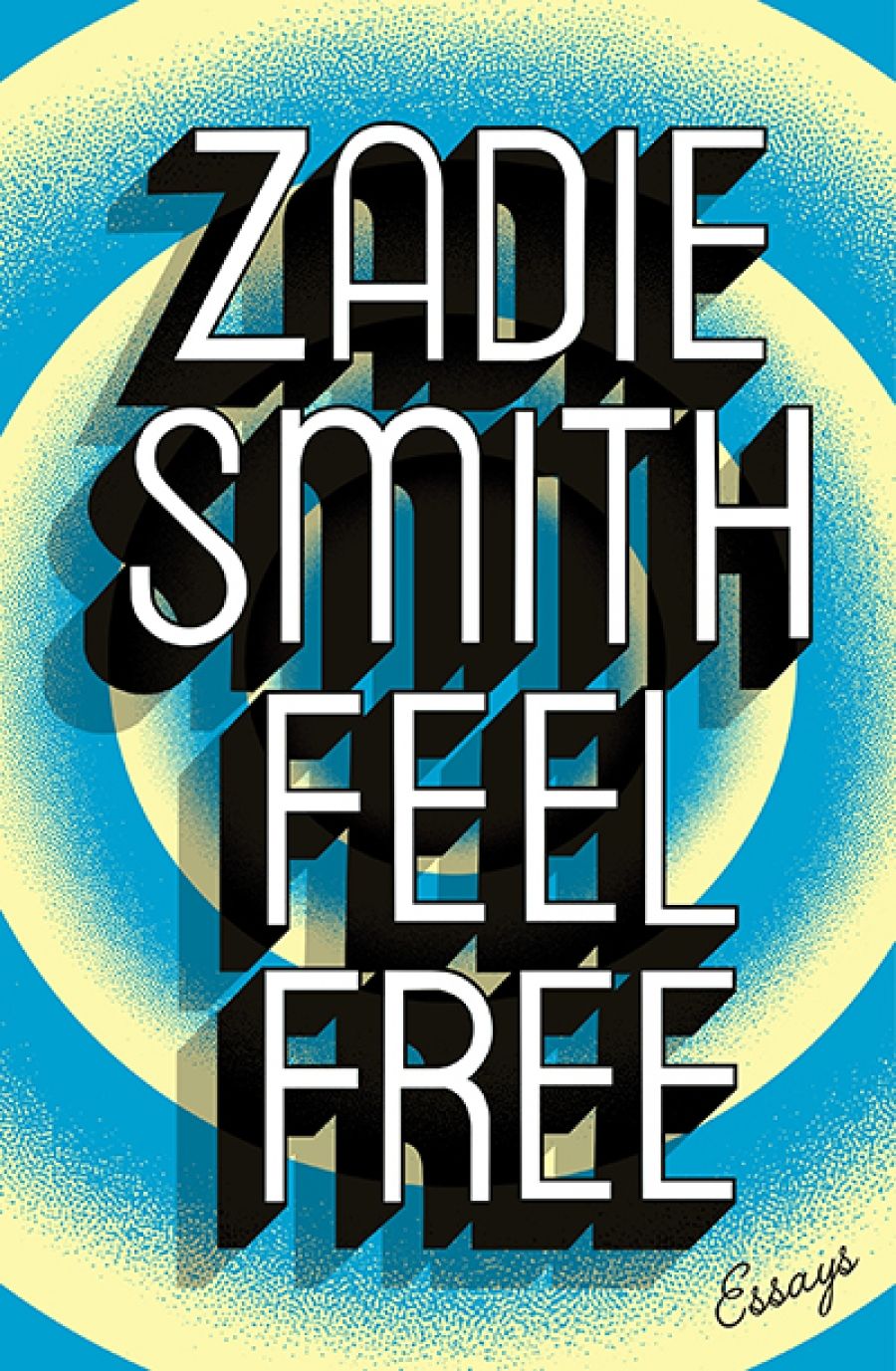
- Free Article: No
- Contents Category: Essay Collection
- Custom Article Title: Sarah Holland-Batt reviews 'Feel Free: Essays' by Zadie Smith
- Review Article: Yes
- Online Only: No
- Custom Highlight Text:
‘When I was younger even the appearance of “I” on the page made me feel a bit ill,’ Zadie Smith confesses in her new book of essays, Feel Free. Shades of this chariness about the personal pronoun still persist in her non-fiction today, which is markedly self-effacing. From the outset, Smith repeatedly attempts to ditch ...
- Book 1 Title: Feel Free
- Book 1 Subtitle: Essays
- Book 1 Biblio: Hamish Hamilton, $35 pb, 459 pp, 9780241146903
The vintage of the pieces in Feel Free – mostly written during the Obama years – might easily render them obsolete, given the velocity of change in pop culture and politics. Only one essay feels a touch dated: ‘Generation Why’, a deep dive into Facebook and the 2010 film The Social Network. Smith offers an incisive critique of Sorkin’s zinger-heavy portrait of Mark Zuckerberg as a spectrumy, sarcastic kid genius, but some of the ancillary issues she frets over – the sophomoric nature of the Facebook interface, for instance – seem quaint given where Facebook now sits in the news cycle: as a witting agent of Russian propaganda. Overwhelmingly, however, she proves a trenchant and astute analyst of timely subjects such as gentrification, climate change, and corruption at the heart of the UK media exposed by the Leveson Inquiry. She also wades into the left’s political exile on both sides of the Atlantic in nuanced essays on Donald Trump’s rise and Brexit, which forgo the customary hysteria in place of a searching introspection about liberal complacency.
Many of Feel Free’s standout offerings grapple with race and identity. In ‘Getting In and Out’, Smith offers a penetrating analysis of Jordan Peele’s breakout horror film Get Out (2017). Underlying the movie’s chilling conceit – white people parasitically occupying black bodies – Smith argues there is an ‘ultimate unspoken fear: that to be oppressed is not so much to be hated as obscenely loved’. Get Out’s theme of the white desire to annex black experience raises the spectre of appropriation, and Smith pivots to the furore surrounding white artist Dana Schultz’s controversial painting of lynching victim Emmett Till, Open casket (2016). Smith is troubled by the notion that the right to make art about black suffering is a clear-cut affair. She asks whether her blonde, green-eyed children could make art about Till:
When exactly does black suffering cease to be their concern? ... If their work of art turns out to be a not especially distinguished expression or engagement with their supposed concern – must their painting be removed from wherever it hangs? Must it be destroyed? To what purpose?
Such vexed questions, Smith notes, make her ‘yearn for absolute clarity: personal, genetic, political’, but she concedes that as a biracial woman, a certain ambiguity and ‘torsion’ is inevitable. Ultimately, Smith’s conclusion is more nuanced than much of the polemic that dominates the appropriation debate: she argues that the idea ‘that we can get out of each other’s way, mark a clean cut between black and white’ is a fantasy. The answer is not to ‘get out’ of each other’s experience, but to ‘go deeper in, and out the other side’.

Another standout essay that picks up a related theme is Smith’s take on Hanif Kureishi’s deliciously profane The Buddha of Suburbia (1990). Reading Kureishi as a young writer, Smith was emboldened by his ‘naughty, bubbly book’, with its refreshing lack of model minorities and the ‘equal-opportunity’ bad behaviour of its characters. Indeed, it is impossible not to see the shadow of Kureishi in the antic energy and garrulous cast of Smith’s début, White Teeth (2000). Reflecting on the outsized effect Kureishi had on her generation, Smith comes back to the notion of liberty: ‘what he gave us most of all was a sense of irresponsibility, of freedom’. Revisiting The Buddha of Suburbia, Smith wonders how its risky irreverence and subversiveness would fare today:
From the point of view of our twenty-first-century world where the only possible reaction to anything seems to be outraged offence, I find it a relief to go back to that more innocent, hardier time, when we were not all such delicate flowers that every man’s casual idiocy had the awesome power to offend us to our very cores.
It is a similar point to one Smith makes in her essay on Brexit, where she bemoans the ‘strange tendency of the younger lefty generation to censor or silence speech or opinions they consider in some way wrong: no-platforming, safe spaces, and the rest of it’. Down that path leads censorship and misplaced moral righteousness. Freedom – to speak, to make art (even bad art), to dwell in ambiguity – is paramount to Smith. It’s not a stretch to read Feel Free as a paean to negative capability.
‘I didn’t know you could speak to a reader like that, as if they were your equal – as if they were a friend,’ Smith says of Kureishi. It is this radically honest tone that makes these essays so riveting. Whether she is writing about Schopenhauer, or taking her father on a ‘grand tour’ of gardens in Italy, or her mother’s pride when the family moved into a maisonette with a bathroom and a powder room – ‘a very British form of achievement’ – you always have the sense that Smith is nattering away to you and you alone. It is erudite nattering, of course, full of virtuoso allusions and dazzling lateral leaps, but it is also intimate and democratic, and lingers just as often on the unknown as the known. Smith may be leery of the first person, but the I of these essays is compelling and utterly free.


Comments powered by CComment